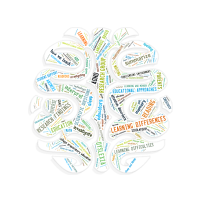

Lab Faculty and Staff
1/12/2018
Failure, Motivation, and Resilience
How does failure dampen motivation -- and how can we encourage students to persevere in the face of failure?
Research has described the motivation to avoid failure and seek success as an “implicit need,” governing individuals’ behavior (1). Self-efficacy theorists suggest that motivation and effort drop following failure because failure damages the individual’s confidence in her ability to achieve success (2). From another perspective, failure may lead to an “adaptive tendency to conserve resources,” thereby decreasing motivation for tasks that are not likely to turn out well (3). The perception of failure on a previous goal-directed task may make an individual more likely to think twice about even trying the task again; for instance, when in an uncertain circumstance, college students who received false negative feedback on their performance on word-association tasks were more likely to conserve their effort and give greater consideration to the amount of reward they might receive (3). Previous failures might lead an individual to think of the next task confronted as more challenging, which may in turn lead to reduced motivation and additional failure (4). Experiencing failure over and over can also limit expectations for future tasks (5), “which in turn produce motivational deficits that translate into weak performances” (6). Following repeated failures, a phenomenon known as learned helplessness can result, in which individuals no longer attempt to respond on a task and become passive (7).
Click on the following links for citations of research articles cited in this section:
- Castella, Byrne, & Covington, 2013
- Bandura, 1986, 1991
- Anand et al., 2016
- Ford and Brehm, 1987
- Atkinson, 1964
- Brunstein & Gollwitzer, 1996, p 395
- Miller & Seligman, 1975; Overmier & Seligman, 1967; Seligman & Maier, 1967
Maladaptive & Adaptive Responses to Failure
- Maladaptive Responses
“I can’t do this.” “I’m not very good at this.” “No fair! This is too hard!” “My teacher didn’t really explain this well.” “My dog kept me up too late last night.”
Surely, teachers have heard these types of comments many times when working with a group of students on a challenging activity. Projecting blame for failure on the task or others, worrying or ruminating excessively about a task after completing it, and engaging in negative self-talk are all considered maladaptive responses to failure. These can distract the student from effective performance (1). Another possible response is defensive pessimism, that is, preparing for failure by setting unrealistic, very low expectations for the activity that then “protect” the student from a clash between their aspirations and an uncomfortable outcome (2).
Even though we all engage in these kinds of maladaptive responses from time to time, frequent experiences of failure are linked to a habitual pattern of negative reactions. “Learned helplessness” is a phenomenon in which individuals deliberately avoid challenges and exhibit low persistence when presented with difficulty. Helplessness researchers state that this pattern results when individuals learn that there is nothing they can do to affect outcomes on a task, or that their responses and subsequent reinforcement do not affect each other (3). Experiments with animals have shown that when animals are subjected to frequent, repeated experiences of failure, they often became passive, even when given the opportunity to act in a way that could change their circumstances. Learned helplessness is similar to what is described as “amotivation,” or a lack of motivation, in which students exhibit passivity, lack of initiative, and a high likelihood of giving up (4).
- Adaptive Responses
“Ok, let’s try this another way.” “Interesting; I haven’t seen one like this before.” “I can do this.” “I guess I’ll have to try harder next time.”
Failure does not necessarily lead to reduced motivation and poor coping. “Although experiences with failure often undermine subsequent performance, they are also frequently found to stimulate it,” perhaps via heightened motivation (1). Experiments with medical students revealed that individuals became motivated to continue working after experiencing failure on a task that was presented as relevant to their professional identities (1). Surveys of seventh graders showed that while some would study less or consider cheating on a subsequent test after a hypothetical failure, others would actually study harder (5). Relatedly, feelings of perceived competence on actual tasks may arise from appropriate or adaptive coping with failure on training tasks (6). In one study, typically-developing school-age boys made effective use of metacognitive strategies like task-specific self-talk and thus were able to independently work their way through a challenging activity after an initial failure (7). Students who undergo positive motivational changes in response to failure display additional adaptive coping mechanisms, such as seeking help, engaging in self-encouragement, and problem-solving (8).
So, what factors differentiate the student who faces failure and feels like giving up, from the student who is able to sustain motivation in the face of failure? Look for our next summary, focused on how individual differences may lead to distinct responses to the experience of challenge.
Click on the following links for citations of research articles cited in this section:


